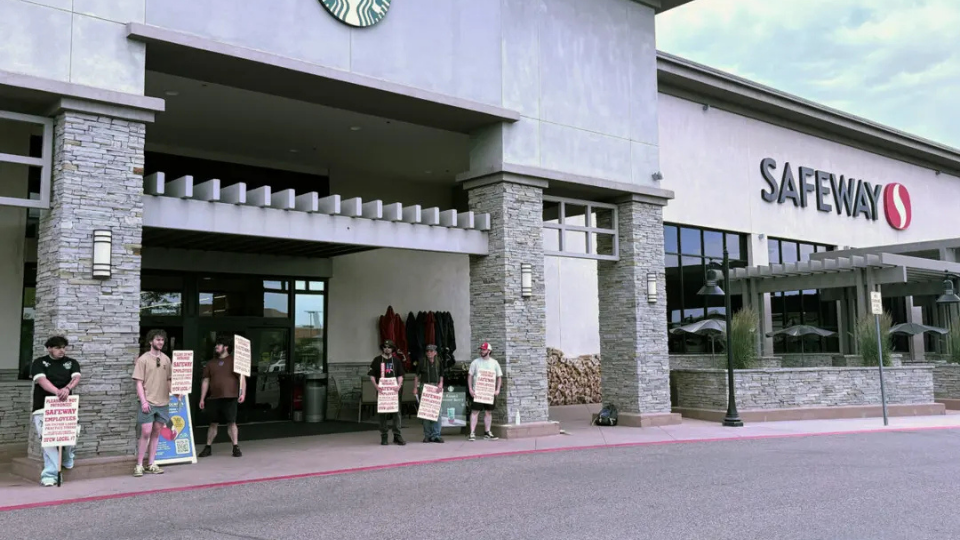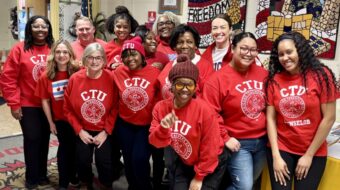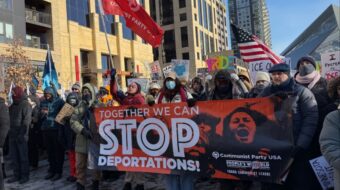
LOS ANGELES—Here we go again. By an overwhelming 90% vote, grocery workers at Kroger, Albertson’s, Pavilions, Vons, and Ralph’s supermarket chains in Southern California authorized a strike. United Food and Commercial Workers Locals 324 and 770 lead a coalition of seven Southern California UFCW locals that together represent 45,000 workers at the grocery chains.
If the workers walk, it would not be the first time the chains pushed them to the picket lines. In 2003-04, a 144-day strike and lockout followed decades of corporate consolidation that has continued to this day. In that walkout, the Teamsters, whose drivers deliver the food which the UFCW members stock, honored the picket lines. The UFCW locals’ bargaining committee reports they’ll do so again.
Locals 770 and 324 were also key leaders in the fight to prevent further consolidation by defeating the recently proposed Kroger-Albertson’s mega-merger. Corporate consolidation has led to aggressive bargaining tactics from the employers and decades of hoarding profits at the expense of workers’ wages.
The union locals said economics is only a part of the reason for their strike approval this time. Rampant unfair labor practices, in other words, breaking labor laws, is the other part. The workers are emphasizing that as a necessary problem to resolve so the local unions can bargain on a fair playing field
“The companies have broken labor laws by engaging in unlawful surveillance, interrogation of members at actions, threats, and retaliation for union activity. This is unacceptable,” the two lead locals declared in a joint statement on June 15. The old contract, which had been extended, expired June 7.
“We have overwhelmingly voted to authorize an unfair labor practice strike at Ralphs, Albertson’s, Vons, and Pavilions throughout Southern California,” the two lead locals said. “We are fed up with these corporations’ union-busting tactics designed to intimidate us and prevent us from getting the fair contract that we’ve earned and deserve.
“For four months, we’ve negotiated with Kroger and Albertson’s, offering solutions to the staff shortage crisis that hurts store operations, working conditions, and customer service. The companies have dismissed our proposals and claimed that our concerns were ‘anecdotal’, downplaying the real challenges we and our customers face daily.
The grocery firms have also offered skimpy raises and refused to budge on other issues, a review of negotiations bulletins from the two locals shows. The companies and the two locals have held 18 bargaining sessions, with one more round scheduled for June 25-27. Meanwhile, the unions plan a mass rally in Long Beach on June 20 and Downtown Los Angeles on June 27.
Bargaining committee member Cammy Fulton, a longtime Ralphs employee, told KWSB in San Diego the companies “haven’t taken us seriously. This vote proves that we’re serious, and we’re ready to act if we must.”
“This vote is a powerful message to Kroger and Albertson’s: We are fed up with their union-busting tactics and unlawful behavior that disrespects workers, silences our voices, and stalls progress at the bargaining table,” the joint bargaining committee said.
The union bargainers admitted there have been “some good discussions on staffing” in the latest round of talks, but little else. And the companies recently offered another 25-cents-per-hour raise. “But we’re still very far apart on what we need to support our families and other issues important to us, like clerk’s helpers working in a higher classification and increased premiums for department heads.”
Meanwhile, action by grocery workers has resulted in settlements in some areas. In Washington State, UFCW Local 3000’s overwhelming strike authorization vote earlier this month forced the company to return to the bargaining table with a serious offer. The resulting tentative agreement, now heading to a ratification vote, includes improved staffing language, with first-ever store-level programs to address chronic understaffing. Workers also secured wage increases, maintained their fully-funded healthcare without benefit cuts, and won new investments in training programs and their pensions.
The tentative deal could set a precedent for UFCW locals in other regions, where staffing and wage gaps remain key sticking points. National pressure on the companies is building from coast-to-coast. In May, 74% of the 8,000 Kroger workers with UFCW Local 700 voted no on a paltry company offer. They’re due to return to the table this week. In Montana, grocery workers have given notice to end their contract extension. Down in Georgia, workers at four Atlanta-area stores have walked out. And Teamsters Local 528 warehouse workers at a Dallas Kroger fulfillment center have authorized a strike vote.
Back in California, though, the UFCW workers are preparing for the three final bargaining sessions, where the locals plan to demand the grocery chains stop their law-breaking and “negotiate a contract that respects workers and invests in safe, fully staffed stores.” The union says its members are “fed up with being overworked, disrespected, and undervalued while corporate CEOs rake in millions.”
The AFL-CIO’s Executive Paywatch study, based on federal data, shows that in 2023, the latest year available, Kroger CEO Rodney McMullen garnered $15.71 million, 11th among all retail CEOs in combined pay, stock options, and benefits. Albertson’s and Ralph’s CEO compensation was not listed.
These two firms have also been busy extracting billions from workers and local communities and sending the profits to shareholders. In January 2023, a coalition of UFCW locals sued to block a billion-dollar dividend to Albertson’s private equity shareholders. That suit failed, and the execs got away with their cash grab, but not without the workers noticing who was getting away all the cash in the company.
Then, within days of the proposed grocery merger failing, Kroger proposed a $7.5 billion stock buyback, and Albertsons proposed $2 Billion in stock buy backs. Again, workers noticed the companies have the money to invest in employees and local communities and have taken that fight to the bargaining table and strike vote ballot box.
A survey the two locals commissioned showed customers of the grocery chains are unhappy, too. They’re complaining about both rising prices and empty shelves.
“Consumer Reports caught Kroger overcharging customers by 18.4%, while the Economic Roundtable’s Bullies at the Table study shows 92% of workers witnessed this practice. A customer survey by UFCW Locals 770 and 324, along with the Los Angeles Area Alliance for a New Economy, reveals most shoppers report severe understaffing at Kroger and Albertsons stores, resulting in empty shelves, unbearable checkout lines, and shifted burden to shoppers,” they said.
In the first bargaining session, March 18, the unions reported, with photos, “customers waiting in lines for over half-an-hour, carts full of go-backs, and empty deli shelves. This not only pisses off our customers, but it puts additional pressure on us to do 10x the work in 1/10th of the time.
“We presented our solution to their understaffing epidemic, which would provide a required minimum number of full time jobs, and minimum total hours based on store sales. They saw the proof but so far the companies have zero response to the crisis they caused. Wouldn’t it be great if they cared about customers as much as we do?”
The conditions led to the locals seeking strong public support, while warning the length of any strike is unpredictable.
“UFCW Local 7 in Colorado was on strike for 10 days and in Oregon, the grocery workers’ strike was only 36 hours. ULP strikes can be for a set period. If we go on strike, our union leaders and bargaining committee will determine the length that is most strategic for us to be out to win the contract we deserve.
“Ultimately, the length of time of a potential strike depends on a number of factors, but how well customers are honoring our strike is clearly the most important,” the bargainers wrote in a q-and-a.
Since the prior strike years ago, several key factors have worked in the workers’ favor. After its end, state officials investigated whether the grocery chains conspired with each other against the workers. And the state legislature passed, and the governor signed, a law making strikers and locked out workers eligible for state-provided health care benefits.
Cameron Harrison contributed to this article.
We hope you appreciated this article. At People’s World, we believe news and information should be free and accessible to all, but we need your help. Our journalism is free of corporate influence and paywalls because we are totally reader-supported. Only you, our readers and supporters, make this possible. If you enjoy reading People’s World and the stories we bring you, please support our work by donating or becoming a monthly sustainer today. Thank you!










